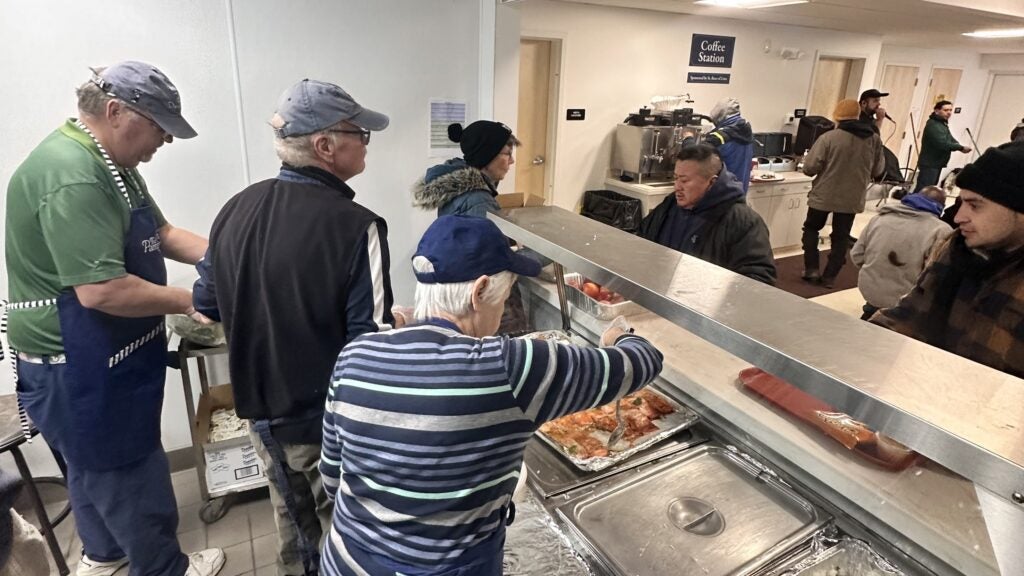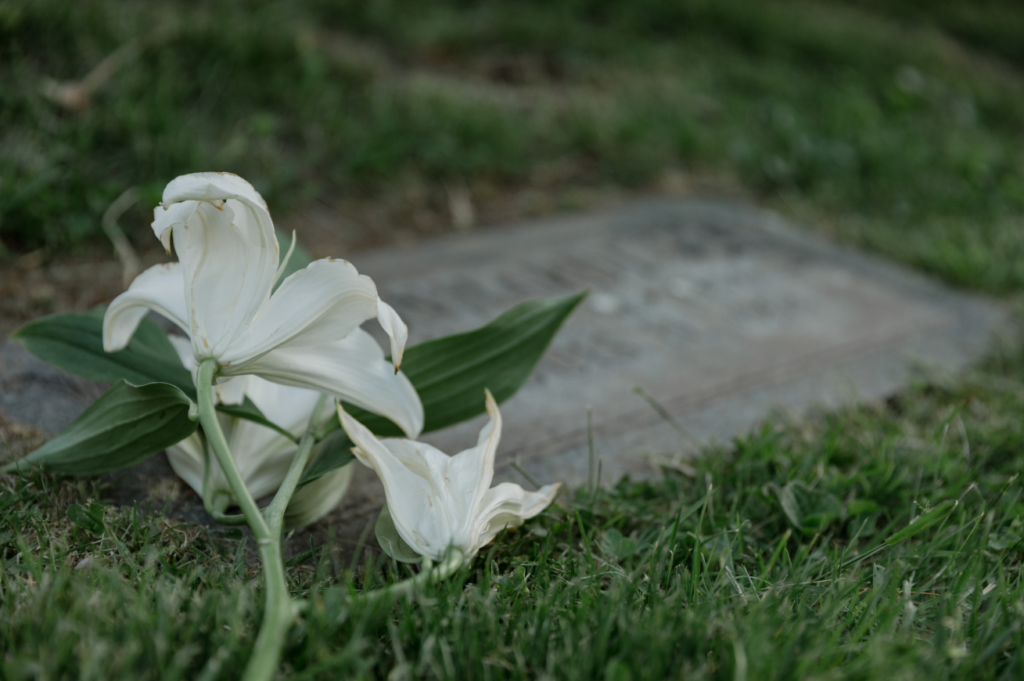
Thomas Merton Center celebrates fifty years of serving the community

Catholic Charities Fairfield program has grown exponentially since ‘soup kitchen’ days
It started with a challenge.
Back in 1974, Fr. John Giuliani, the charismatic Sacred Heart University (SHU) campus minister, and his prayer group invited Kathleen Thorsby of the Washington, D.C. Center for Creative Non-Violence to report on the recent opening of a soup kitchen in the D.C. area.
“We have a need in Bridgeport. You should open one up here,” suggested Kathleen Deignan, then associate campus minister and a recent SHU graduate.
“No, you should open one up here,” countered Thorsby.
“She threw down the gauntlet, and we picked it up,” recalls Deignan, now a member of the Sisters of Notre Dame and a professor emerita at Iona University. “This was a rich time in the Catholic community, with a strong social justice ethos going on. We were all inspired by the Catholic Worker movement and the idea of having houses of hospitality like those begun by Dorothy Day. That spirit launched our whole initiative and informed everything about the way it was undertaken.”
From the beginning, the vision for this soup kitchen was different. More than just a spot to pick up a sandwich, it was to be a place of hospitality, a corner of respite for those on the margins of society. But first, Fr. Giuliani and his eager band of former students and volunteers had to secure a location.
“Fortunately, he had the support of Bishop Walter Curtis and Ed Kirshner, who was director of social ministries for the diocese. Father John found and arranged for us to use a small, abandoned fire station by the railroad station,” remembers Evelyn Avoglia, another founding member. The group spent weeks tearing up the floor, painting walls, installing kitchen equipment, and scrounging up tables and chairs before opening the doors in November 1974. Inspired by the contemplative Thomas Merton, a Trappist monk and prolific writer known for his social justice activism and call for interfaith dialogue, they named the house of hospitality after him.
There had, of course, been an awareness of food insecurity in the city prior to the opening of the Thomas Merton House of Hospitality. A coalition of worship congregations in Bridgeport had held fundraising CROPwalks to address urban hunger, and community members stocked the pantry shelves in their own churches. Still, “this was the first place in Bridgeport where people could come in for a sit-down meal,” says Avoglia.
On that November opening day, the volunteers went out into the community and invited people to come in and break bread. A handful of men took them up on the offer; a few weeks later, the group was hosting 40 people, then 60, each day.
“We were serving a hearty soup, plus bread. And every donut shop in town gave us what didn’t sellout by 4 p.m.,” says Avoglia.
It takes a village
Sacred Heart University has long placed emphasis on the role of the laity within the Catholic Church and empowered members to tackle issues wherever they saw a need. And, largely inspired by Fr. Giuliani, the laity responded.
“Father John was larger than life, with a sense of the performative mystery of the liturgy to make it engaging,” remembers Sr. Deignan. “He was a diamond with facets all over the place: as an artist, a poet, a homilist. His parents were Italian and he always said he learned all about hospitality at his family’s kitchen table.”
Father John was also a roll-up-your-sleeves kind of person. There’s no way to exaggerate his ability to draw out the skills of every person who crossed his path. We were like sparks being spun off a firecracker
Evelyn Avoglia
Those early sparks included founding member Tommy Murphy; Justine Nutz, SSND, who offered haircuts to guests once a week; Bread-baker Edna May and her husband Charlie; and Gina Sader Rubenstein. Jeannie and Bill Dorfer were also actively involved, and Bill eventually became the Thomas Merton House’s first formal director.
Christina Wills was a case manager for 34 years until her recent retirement. “When I first walked in the door in the early ‘80s, I knew I belonged,” she recalls. In those days, “there was far fewer staff and no specific titles, so we would all take turns cooking and our duties overlapped.”
While issues of mental health, poverty and alcoholism are constants among guests, Wills saw new challenges emerge over the years: more powerful drugs, such as crack and fentanyl, plus the AIDS epidemic. Then there are others who frequent Merton House not because of poverty, but because they’re seeking a sense of community.
“One of the things we all struggle with is judging people before we know them, and we don’t do that at Merton House. Our mission is to respect people and meet them where they are,” says Wills. “I still stop in and visit, and make it a point to talk with people, not to them. The most important thing we do, and what sets this place apart, is our relationships with our guests. We always remember to be there for them.”
When he was struggling with homelessness, “the Thomas Merton Center was the place where I could come and eat, gather my thoughts and see how I could go about my day,” says Jorge Cruz. Sober since 2003, he now works as a recovery specialist with the Department of Mental Health and Addiction Services.
God’s grace is upon this Center. God’s grace is upon the staff, because your love is there for the community.
Jorge Cruz
A helping hand for those in need
From its initial location by the railroad station, the Thomas Merton House moved to Elm St., and was soon serving 200 meals a day. But because the space was so small, the staff had to admit guests in five staggered seatings of 40 people each. With the move to St. Joseph’s Church on Madison Avenue in 1989, the staff’s ability to serve greatly expanded. So did its reputation within the City.
“Our fundraising was all through our newsletters, which came out quarterly, and people just gave and gave. I remember people walking in the door and handing us $100 bills,” says Maryann Furlong, who joined the staff as an assistant director in 1987, then became director in 1992. She stayed for another 15 years until her retirement.
The striking, 5,500 square foot space allowed staff to address some of the myriad needs of guests. Hiring a social worker was high on the list. Volunteers Jeannie Tisdale and Madeline Lacovara collected clothing, started the Merton House coat closet, and opened a thrift shop to raise money. In addition to serving breakfast and lunch, Merton House also started a food pantry, and in 2005 added shower facilities.
“Initially, our guests were mostly men, but within a few years we began to see more and more women and young children. Because of that, we started a family center in the little blue house behind the church. It was all about modeling good parenting skills and letting the moms interact with each other,” Furlong says. Because some of the children had developmental delays or other issues, “occasionally, the director of the Family Center, Laurene Tucciarone, would go to school with the moms to advocate for her child.”
If a guest needed help conquering an addiction, there was someone available. If that guest was not ready, he or she could still walk in and just have a meal. “The fact that they can come in and be with others is a success right there,” says Furlong. “At the Merton Center, they’re laughing, they are kind, and they share.”
Into the future
Fr. John Giuliani’s “house of hospitality,” now named the Thomas Merton Center (TMC), has grown to become the largest soup kitchen and pantry in Bridgeport, where 68 percent of the population is classified as ALICE—asset limited, income constrained, but employed. Among that number, over 20 percent live in poverty. On an average day, TMC serves 350 meals. But during the pandemic, that number climbed to 650, as TMC remained open while so many other services in the city were shuttered.
“We didn’t close, not for one day, and I’m very proud of that,” says Bill Colson, TMC’s current director. During those uncertain times, he watched the number of those in need soar as hourly workers lost their jobs and as other services in the city closed. In addition to providing meals to those in the area, TMC prepared and packaged meals for several churches and senior centers, some of them as far flung as Stratford and New Haven.
“You can’t just say “no” to people because they aren’t in your district,” says Colson simply.
Changes had to be made, of course. Shelton developer Bob Scinto provided a shed that was used as an outdoor serving station. Staff had to clean the showers according to CDC guidelines after each use, and portable toilets were brought in for guests. Staff continued to run the pantry, providing up to five days of groceries for families in need. Colson also started Project Warm, using the blue house behind the church to gather coats, gloves, and sleeping bags for those living on the street.
“This was all done with our staff of seven, plus a handful of dedicated volunteers. We sent the other volunteers home for safety reasons,” he adds, noting that TMC typically benefits from the services of 500 volunteers a year.
A new chapter
Currently, TMC’s programmatic progress and capacity have been constrained by the size and rapidly degrading condition of the century-old St. Joseph’s Church. Renovations were discussed, but were deemed too costly. Again, the Board turned to Bob Scinto, who suggested that rehabbing a newer facility would better serve TMC’s needs.
“He’s been unbelievably helpful,” acknowledges Colson.
Slated to open in early December 2023, the newly named Thomas Merton Family Center at 1406 State St. is destined to be a game changer. A core initiative of Catholic Charities, the 13,000 square foot Center will include a dining hall, kitchen, food pantry, and multi-purpose room, elevators, showers and office space. The goal of the newly expanded Center is to become a premier human service family center, offering wraparound services through partnerships with other agencies. A partnership with the Southwest Community Health Center, for example, will allow guests to access medical, dental and behavioral health services. Partnerships with St. Joseph Parenting Center, Career Resources and CT State Community College (formerly Housatonic Community College) will provide parenting and ESL classes, immigration and financial advice, and job training. Having all these services available under one roof ensures a better outcome for clients, getting them on the road to self-sufficiency more quickly.
“When dealing with a high-risk population, it’s challenging to get them from one point to another, and they tend to miss a lot of appointments. That’s not only difficult for staff, it hinders the client’s success,” says Colson. “Plus, it puts more pressure on city services because people end up using the hospital emergency room or other municipal facilities.”
Within the new Thomas Merton Family Center, a guest can come in and have a meal, then speak to his or her caseworker and go directly upstairs for a health checkup or job training. Instead of working in silos, everyone involved in that person’s care will be able to communicate more easily. It is expected that the Center will serve another 3,000 annually.
Story courtesy of Catholic Charities of Fairfield County, Inc.








